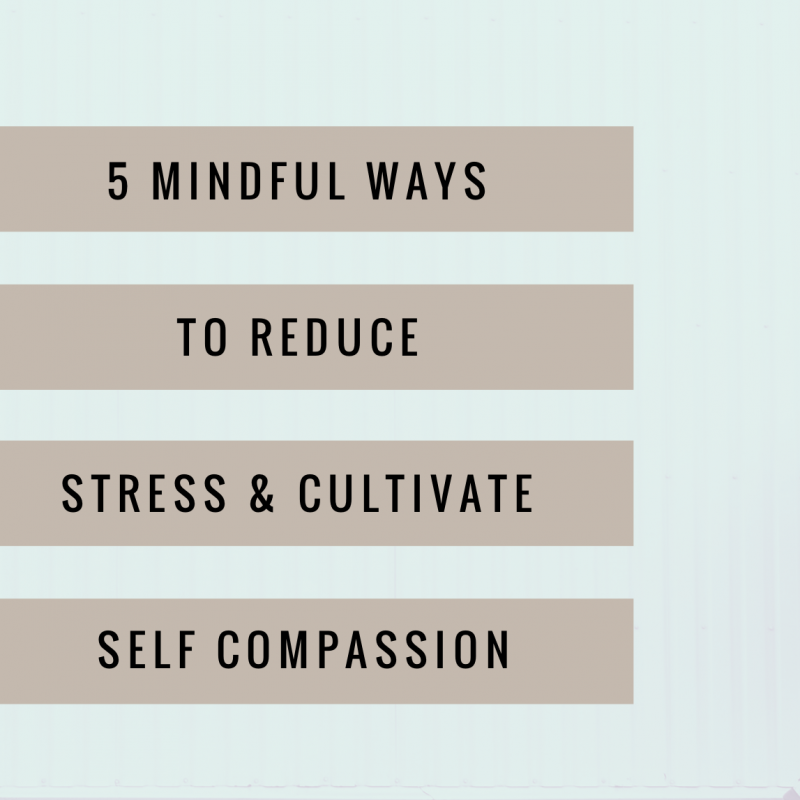5 Mindful Ways To Reduce Stress & Cultivate Self Compassion
Stress is unavoidable in our world, but it does not have to keep you from living a full & happy life! Family, money, work, school, friends, all create daily stress, while bigger issues like terrorism, politics, and social issues contribute to our underlying stress levels. Many studies have linked insomnia and chronic stress. According to APA’s Stress in America survey, more than 40 percent of adults say they lie awake at night because of their stress. That’s a lot of people! In the end, it all boils down to our habits, our inner dialogues and the way we approach good & bad stress in our lives.
What’s the difference between Good Stress & Bad Stress?
Good stress motivates you. Also called, ‘eustress’, good stress can propel you forward, helping you achieve more goals, it keeps you motivated, leading you to more happiness, fulfillment, and success. Good stress is generally something that provides you motivation to get something done or leads you to overcome an obstacle. For example a deadline, a test, giving a speech, learning a new skill or training for a marathon.
Bad stress in ongoing, chronic, and can slow you down and keep you from doing the things you need to do. Bad stress can keep a person in the fight or flight mode — a threatened state — for a long period of time, which can have detrimental effects on the body. According to the National Institute of Mental Health, bad stress can lead to long-term harm affecting our overall health, it can also lead to irritability, weight gain, heart disease and can cause dysfunction in the immune, reproductive, excretory and digestive systems. Situations that could contribute to bad or chronic stress include but are not limited to ongoing relationship troubles, negative influences such as toxic friends or workplace environment, ongoing high demands at work with little to no reprieve or even a loss of a loved one.
So how can you reduce stress through mindfulness to cultivate self-compassion for yourself? Below I am sharing 5 ways to reduce your overall stress in life, through being mindful of your body & inner dialogue, to help you regain your energy & feel more at peace. All of these tips help to cultivate a more mindful life and more compassion for yourself.
Shift Your Perspective & Reframe the Situation – Sometimes we have to shift the way we see & think about things in order to live more peacefully. The mind and body are intrinsically linked. You can choose to either view stress as something that is wreaking havoc on your body (which it can) or as something that gives you strength to overcome adversity. Harvard researchers have theorized that changing the way we think about our bodily responses can improve our physiological and cognitive reactions to stressful events. To shift your perspective you must change your internal dialogue (reframe the situation) about stress which in return will help you in the way you react to stress. Often times we meet stress with a response such as, “I am so stressed out, I have so much to do, I am worried, my fast breathing is a sign of my anxiety being triggered, this can’t be good for my health. Agh, nothing is okay.” Sounds like a downward spiral, right!? Shifting this perspective through reframing the internal dialogue would sound more like this, “I do have a lot to do, I will get it done, let me ease my worry by taking a few deep breaths, my faster breathing means more oxygen is getting to my brain so I can think more clearly. Everything will be okay.” Do you hear the compassion in the reframed sentence? Stress when good, can make you stronger. Reframing negative self-talk that leads to stress can over time help you deal in healthier ways with future stress. Learning to shift the way you think about stress can help you to react in helpful ways that show yourself & body more compassion.
Breathe More – It’s really easy to forget to breathe especially when you are frustrated and stressed out. Deep breathing helps you to release tension and stress in your body. When you breathe deeply, your brain gets signaled to calm down and relax, the brain then sends this message to your body. Often times when you are stressed or in a stressful situation, your body shows you signs. These signs include high blood pressure, increased heart rate and shallow breathing. Being mindful of your breath in these situations can help to reduce the stress you’re feeling both in the body and the mind. According to Dr. Andrew Weil, M.D., “Practicing a regular, mindful breathing exercise can be calming and energizing and can even help with stress-related health problems ranging from panic attacks to digestive disorders.” As you become more mindful of how your body responses to stress try easing yourself through focused breathing. Learn some breathing exercise to utilize daily and whenever you are feeling stressed from Dr. Weil’s website!
Accept The Things You Can’t Change – We’ve all been there… stressed out over things/people/situations that we can not change. Let’s work through an example. Let’s say you are driving and all of a sudden you hit gridlock traffic and the GPS says there will be a long delay in your commute. Let’s also say you can not exit the highway and the route you’re on is the only way to your destination. You generally have two choices in this situation; complain & begin to stress yourself out about being late/or being stuck OR realize you can not change a thing about the present situation, all you can do is choose your attitude and deal with it. You could jam out to your favorite playlist, call a friend to catch up or listen to your favorite podcast. It’s all about acceptance. Sometimes you really can not change or control the situation you are in but you know what you can change and control? Your attitude.
Remind Yourself Of Your Strength & Capabilities – Sometimes we get so caught up in a stressful situation that we forget that we have made it through stressful situations in our past. Remember all those times you had something due and you stressed out about it but you got it done? It’s important to remind ourselves of our past triumphs and tribulations that have made us stronger. Show yourself more compassion by reminding yourself of the challenges you’ve faced, survived, learned and grown from. See strength in your own capabilities.
Seek Social Support – Leaning on your trusted circle, friends, family or counselors who know you and who will root/help you without judgment can really help to reduce stress. Asking for help does not mean you have failed or that you are not a strong or successful person. It means you are human and you need social support, it’s one of your basic human needs. Asking for help is one way you can show yourself compassion. Ask for understanding, encouragement and some TLC. People who reach out to friends, family, and other supportive people/groups tend to find relief in support and fare better during stressful times. Try finding a local support group in your city. If high-stress levels continue for a long period of time, or if stress continues to interfere with daily activities in your life, reach out to a licensed mental health professional. Chronic stress can be treated with appropriate interventions in therapy. Seeking support outside of family and friends can be beneficial in overcoming the barriers keeping you from living a happy life and can also help you learn better ways to manage the stress that is specific to your life & situation.
Did you find this post helpful? If so let me know down below in the comment section! Know someone who could benefit from this post? Please share it with them!
Love,
Shayda

